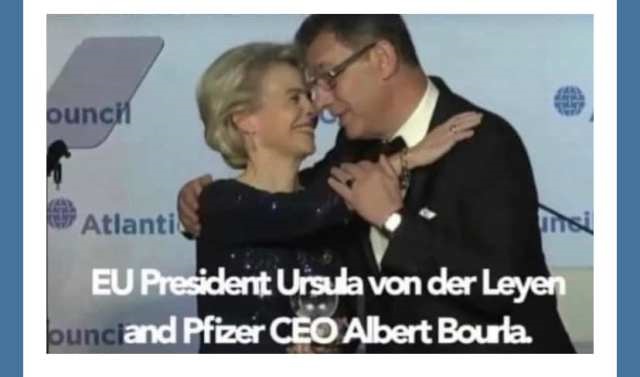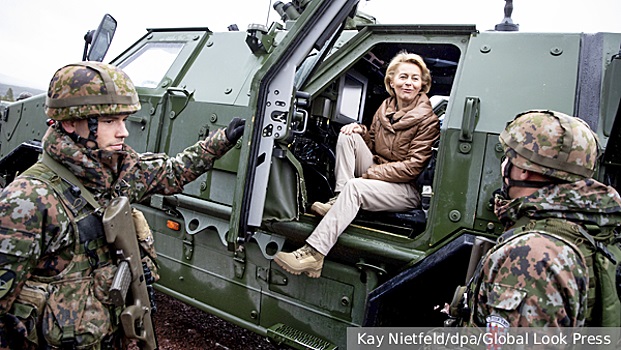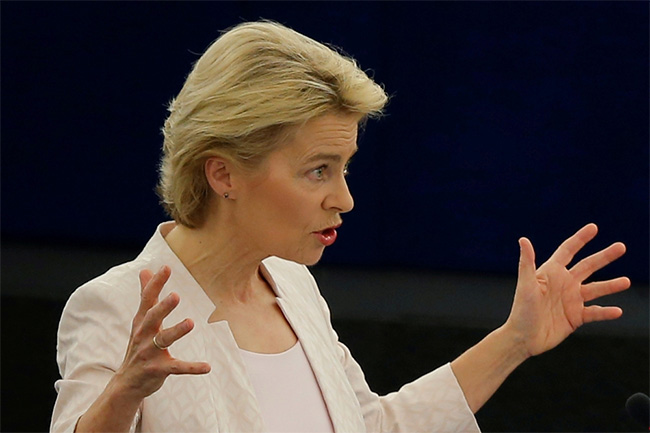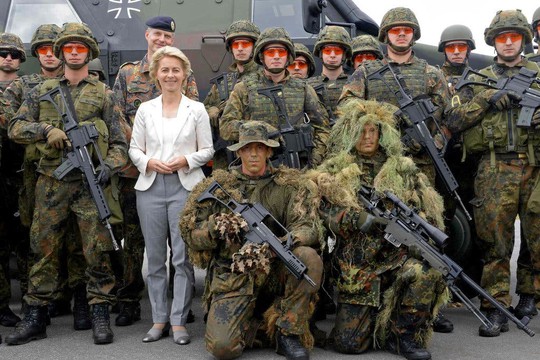Ursula von der Leyen visited soldiers with Germany’s naval special forces.
Photo: Reuters
The European Commission chief is secretive, controlling, and faces an in-tray from hell over the next five years, notes POLITICO.
After the far right rattled the political establishment in a Continent-wide election last month, those same, bruised mainstream party leaders dusted themselves down and delivered a resounding rebuke, reappointing their own veteran centrist to the most powerful position in the European Union.
Ursula von der Leyen, a 65-year-old former German defense minister, has been rewarded for steering the EU through a tumultuous period of pandemic and war with another five-year term at the head of the bloc’s executive arm, the European Commission.
But with populist and nationalist forces now ranged against Europe’s political mainstream gathering momentum across the Continent — and over the Atlantic — she shouldn’t count on a honeymoon.
By the time her second term ends in 2029, another Donald Trump U.S. presidency could have come and gone, far-right leader Marine Le Pen could be running France, and any number of other populists could be perched at the EU’s summit table alongside Hungary’s Viktor Orbán.
“It will be an extremely difficult five years for her,” said a senior EU official.
For one thing, everyone in European politics knows von der Leyen already. And they are not all fans.
She will have to deal with critics who point to her controlling, secretive and distant leadership style. She generally consults with just a few trusted advisers — who are usually German — and even sleeps in her office, on the 13th floor of the Commission’s HQ in Brussels.
When the pressure is greatest, she tends to take the most serious matters into her own hands, an instinct that can cause her trouble.
At the height of the pandemic, for example, von der Leyen hinted that she had personally negotiated a massive vaccine contract with Pfizer CEO Albert Bourla via text message on her mobile phone, leading to an ongoing lawsuit alleging she breached the EU’s transparency rules.
 A kiss for a million…
A kiss for a million…
Top European prosecutors are investigating allegations of criminal wrongdoing in connection with vaccine negotiations between European Commission President Ursula von der Leyen and the CEO of Pfizer, according to a spokesperson from the Liège prosecutor's office, POLITICO informs. Investigators from the European Public Prosecutor's Office (EPPO) have in recent months taken over from Belgian prosecutors investigating von der Leyen over "interference in public functions, destruction of SMS, corruption and conflict of interest," according to legal documents seen by POLITICO and a spokesperson from the Liège prosecutor's office.
More recently, after Hamas’ October 7 attack on Israel last year, she badly misjudged the political mood in EU countries by meeting with Prime Minister Benjamin Netanyahu. That prompted a major political crisis, threatening to undo her credibility just as she geared up to launch her campaign for reelection.
On the right wing of European politics, she faces critics who castigate her embrace of “progressive” policies such as action to combat climate change.
It will be harder to ignore all that noise now that the right wields more power.
But how will von der Leyen, Europe’s safe pair of hands, fare in the years to come? With Trump’s return to the White House in November looking more likely than ever, she will be hard-pressed to keep the transatlantic relationship on an even keel. The past four years have seen what’s widely described as a “golden age” for the EU-U.S. relationship under Joe Biden.
While EU leaders took comfort in the fact that Trump didn’t actually undermine the NATO alliance in any significant way as president, this time around they’re braced for Trump and Vance following through on their threats by severing the 80-year-old transatlantic bond.
Vance’s appointment is particularly worrisome for Europe and for von der Leyen. Indeed, the 39-year-old Senator’s assertion that he “couldn’t care less what happens in Ukraine” threatens to leave her and the rest of Europe’s pro-Ukraine leaders alone to face Russian aggression.
Von der Leyen is “going to be hit with more economic nationalism, trade war and protectionism from a Trump administration,” said Majda Ruge, a policy expert at the European Council on Foreign Relations, a think tank. “Where she might be able to establish a positive relationship is on China, by playing a big role in promoting economic security and export controls.”
It will be up to the poised German conservative to fend off an all-out EU-US trade war.
While von der Leyen has won a key battle for centrist forces, stalwart allies such as French President Emmanuel Macron and German Chancellor Olaf Scholz, normally the twin engines that propel the EU, are politically weakened following dismal election results in their respective countries. Macron’s France is especially febrile following his decision to call a snap election in recent weeks after dissolving his country’s parliament.
The hard right leaders promise to resist as von der Leyen tackles the number one challenge of her second term: making huge amounts of EU money available to reindustrialize and re-arm the EU.
Aides to von der Leyen insist she has the benefit of experience to deal with what’s coming. But, in a town known for speaking in bureaucratese, other EU officials are surprisingly blunt about her challenges
“Everything that costs anything — for example, Ukraine defense,” will prove “problematic” during von der Leyen’s second term, said one senior EU diplomat, who was granted anonymity to speak freely.
 Some like it hot…
Some like it hot…
Ursula von der Leyen has vowed to create “true European Defence Union” including an “air shield” across the bloc in the face of the threat from Russia, having been re-elected as the EU’s top leader for a second five-year term, ‘The Independent’ notes.
Ms Von der Leyen pledged that the union will have flagship projects around air and cyber defences to ward against threats such as ‘Russian aggression’ and uncertainty over continuing American support for Kyiv with Donald Trump running for the White House again.
“Working with member states and in close coordination with Nato, we will propose a number of Defence Projects of Common European Interest starting with a European Air Shield and cyber defence,” she said.
As uncertainty around US support for the bloc’s defence grows, EU chief Ursula von der Leyen has vowed to create a ‘European Defence Force’.
Defence policy in Europe has traditionally been the domain of national governments and NATO, which the US gives significant backing to.
How much Europe will be able to rely on the United States should Trump and his “America first” doctrine return to the White House in November’s election? The European Commission is seeking to push more joint European defence projects.
 We will create a ‘European Defence Force’.
We will create a ‘European Defence Force’.
Photo: Reuters
The Kremlin claimed Ms Von der Leyen’s EU defence pledge was a sign of the EU’s shift to “militarisation” and “confrontation”.
Plans by European Commission (EC) President Ursula von der Leyen to turn the EU into a defense union indicate Europe’s intent to militarize and that it is getting ready for confrontation, Kremlin Spokesman Dmitry Peskov told reporters, TASS informs.
Commenting on the EC chief’s initiative, the Kremlin official said: "This yet again confirms the intent of European countries toward militarization, the igniting of tensions, confrontation and reliance on confrontation methods in their foreign policy."
Peskov noted that the joint defense and security policy is one of the tracks of shared work within the framework of the European Union. "It has always been like this within the framework of European integration," he pointed out. That said, the Kremlin official stressed that "this has never been the main direction of the European Union’s development." "Apparently, Ms. von der Leyen was talking about a change in priorities and about this union taking on a military approach," he added.
"It is difficult to provide some exhaustive interpretations here but it is obvious that this work will intersect with interaction of EU countries within the framework of the North Atlantic Alliance," Putin’s press secretary concluded.
Kremlin says proposal by Ursula von der Leyen shows Europe’s ‘militarisation’. Russia has warned that the European Union is growing more militarised and confrontational as the bloc’s president outlined plans for a new defence union, Al Jazeera stresses.
European Commission President Ursula von der Leyen said she hoped to launch a European Defence Union to deal with cross-border threats over the next five years, starting with a “European Air Shield and cyber defence”.
“We will ensure that these major projects are open to all and we will use all of the tools at our disposal – both regulatory and financial – to ensure they are designed, built and deployed on European soil as quickly as possible,” she said in a document setting out her programme ahead of the European Parliament vote on Thursday.
Kremlin spokesman Dmitry Peskov said the proposal demonstrates von der Leyen’s “changing priorities” and the EU’s “military colouring”.
“[It] confirms the general attitude of European states to militarisation, escalation of tension, confrontation and reliance on confrontational methods in their foreign policy,” said Peskov.
“Everything is quite obvious here.”
The Kremlin spokesman added that while Russia did not pose a threat to the EU, actions by its member states regarding Ukraine “have excluded any possibility of dialogue and consideration of Russia’s concerns”.
“These are the realities in which we have to live, and this forces us to configure our foreign policy approaches accordingly,” Peskov said.
read more in our Telegram-channel https://t.me/The_International_Affairs

 11:08 20.07.2024 •
11:08 20.07.2024 •























